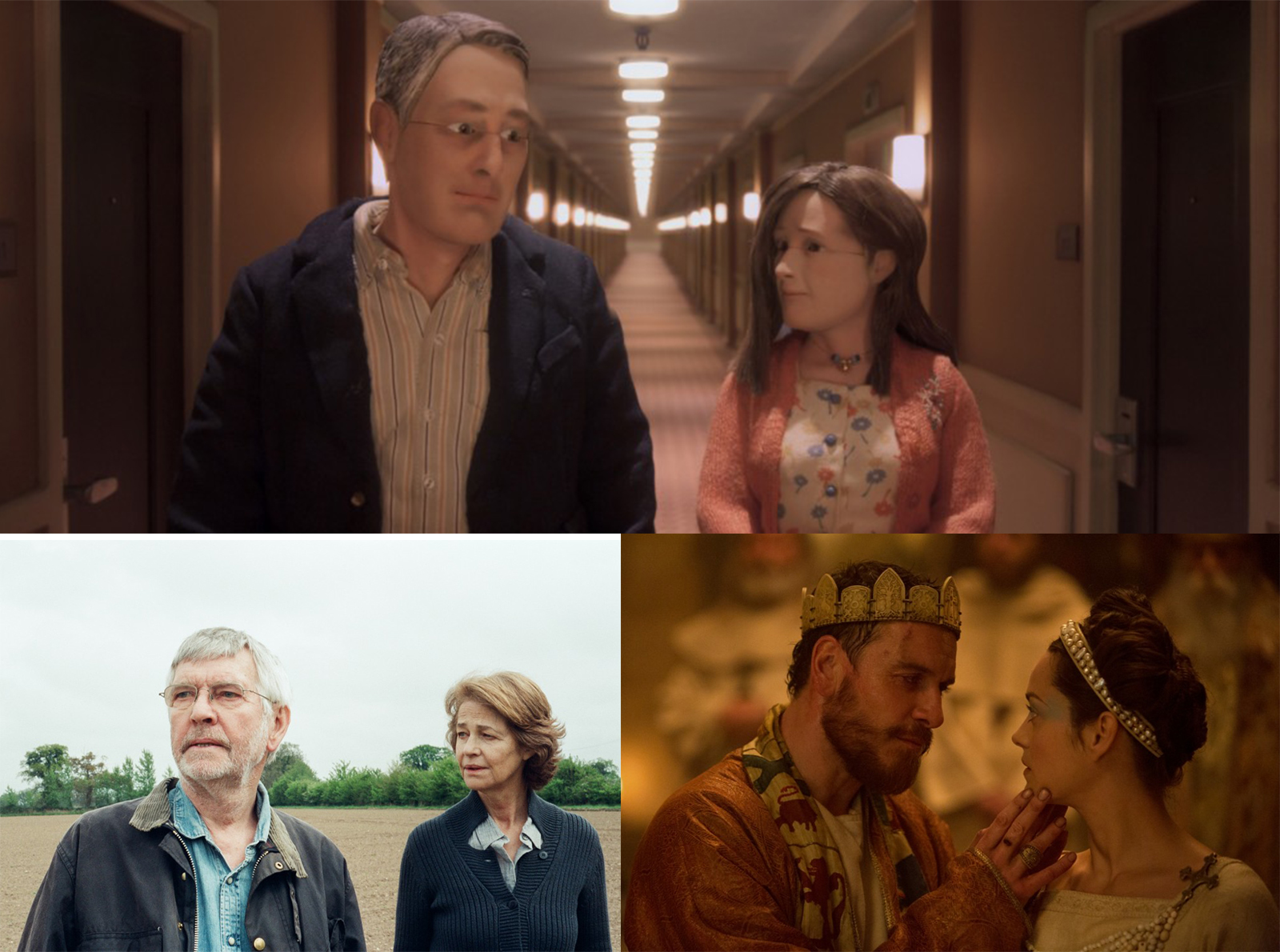AFI Fest Day Seven: Past careers return to celebrate, haunt and enhance

Day seven of AFI Fest saw the snarkily funny “Anomalisa” (top), the subtle “45 Years” (bottom left) and the bloody “Macbeth” (bottom right).
(Starburns Industries, The Bureau and See-Saw Films)
By Sebastian Torrelio
Nov. 12, 2015 5:51 p.m.
AFI Fest is just as much about movies as it is about people.
The yearly celebration devotes a lot of time to highlighting people – not just those acting or working behind the scenes, but everyday individuals whose stories are reflected and justified in films.
This year’s AFI Fest tribute event was dedicated to Charlotte Rampling and Tom Courtenay, who share the screen in Andrew Haigh’s newest film “45 Years.” Together, they discussed their careers and working in the industry since the ‘60s. At the same time as that event, Ridley Scott was speaking about his illustrious directing career, and Michael Caine was joining director Paolo Sorrentino for a Q&A on their new film “Youth.”
All of these film personalities, who have worked in the industry longer than most at the festival, spoke at length about their highs and their lows. With so many intimate talks with public audiences, Thursday’s films reflected the theme of recognizing how people can make a film come to life or knock it down.
“45 Years” is an incredible portrayal of two aging lovers who, due to an illness at the time, are celebrating their 40th wedding anniversary five years late. A week before the party, a letter is delivered to their door that shakes everything up. Haigh subtly builds on the letter’s information, playing with the emotions of the two actors on screen as much as he does the captivated audience.
“45 Years” is an emotional march towards doom and dread that films rarely express successfully nowadays. Haigh’s film is the kind of interpersonal picture that speaks only in wounded love, leaving a scar or two with every viewer.
“Anomalisa” is a love story of an entirely different kind, but it hurts all the same. Director Charlie Kaufman’s stop-motion animated film is an ode to everyday people.
The movie begins with Michael Stone (David Thewlis), a businessman making his way to a Cincinnati hotel for the night. Along the way, he encounters many similar individuals with blunt, idyllic ways of talking (all voiced by Tom Noonan). It feels like Michael is in his own self-obsessed world until he meets someone who changes his perspective.
It’s been more than seven years since Kaufman’s last movie, but in no way has he lost his talent for looking at life through a fractured lens. He has a knack for seeing the hurt in people while not overshadowing the cracks within society, and “Anomalisa” is no exception. But the ideas in “Anomalisa” are out of this world and hard to swallow even hours after the first viewing. It’s snarkily funny and wonderfully intimate, and it also captures a universal truth.
The originality of “Anomalisa” is hard to match, unless you’re “Macbeth.” The newest take on William Shakespeare’s famous tragedy, Justin Kurzel’s “Macbeth” is a shining portrayal of horrifying drama and war, thrust to the forefront by Michael Fassbender in the leading role. Fassbender’s ability to communicate with both his devilish tongue and the tip of his sword are awe-inspiring on the battle field, and disturbingly muted in the castle halls.
“Macbeth” is a film that rises because of its detail. Its most entertaining scenes drip with gore and violence, or with slow-motion shots of men whose inner fear has been torn away from their blood-soaked exterior. With Marion Cotillard as Lady Macbeth, Kurzel and his team challenge how betrayal is protrayed in cinema with their visionary take on death and aristocracy. Each shot is a marvel, and each line delivered with a sense of maddening corruption.
Thursday’s movies showed that people are cruel, people are different, but they are also human. The films provided sharp takes on love, sentiment and human interaction, but just like life, they warn about the striking stabs of heartbreaking shock and awe that follow.
Compiled by Sebastian Torrelio, A&E senior staff.


